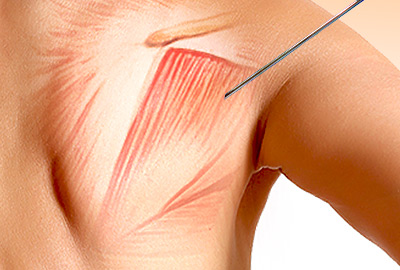Experiencing muscle tension can put a great toll on a woman's quality of life, including restricting her mobility and putting strain on the joints. The good news is that knowing the right approaches can help women put a stop to this pesky symptom and go back to feeling like themselves again.
Continue reading to discover how to get rid of tense muscles and keep your hormones in check during menopause to restore your mobility for years to come!
Three Approaches to Treating Muscle Tension
There are three approaches to treating muscle tension during menopause: (1) Lifestyle changes, (2) Alternative medicine, and (3) Medications, starting from the safest, low-risk options and moving to more invasive treatments only if necessary.
Lifestyle Changes for Muscle Tension Treatment

The first level of muscle tension treatment entails no risk, but it demands the most self-control. Nonetheless, implementing simple lifestyle changes can result in substantial improvements in mobility and reduction of discomforts.
Nutritious Diet
The nutrients from food are used by the body to support proper muscle function, including movement and repair. As such, it is key to maintain a nutritious, balanced menopause diet with healthy sources of lean protein, complex carbs, and healthy fats as well as the following nutrients:
- Phytoestrogens are plant-based compounds that help resolve hormonal imbalance in the body to treat symptoms, such as muscle tension, electric shock feeling, or tingling extremities.
Oats, tomatoes, flax, alfalfa
- Magnesium is an important mineral for muscle contraction regulation. Its abnormal levels may cause lactic acid build-up, resulting in tight muscles.1
Spinach, avocadoes, pumpkin seeds, almonds
- Potassium is essential for controlling muscle contraction and maintaining proper communication between the brain and the muscles. Its lack can cause muscle tension and fatigue, among other symptoms.2
Salmon, bananas, peaches, sweet potatoes
- Water is an inseparable component of a healthy diet for muscle tension treatment as studies have associated dehydration with compromised muscle function, including tension and stiffness.3
Regular Exercise
Both, use and misuse of muscles due to a stationary lifestyle or strenuous workouts can result in muscle tension. As such, creating an adequate exercise routine can be invaluable muscle tension treatment, improving circulation and flexibility.
Amount: The general recommendation for middle-aged women is to engage in 150 minutes of moderate physical activity per week, or 75 minutes of intense exercise per week.4
Type: The best exercise routines for relieving tense muscles consist of low to moderate aerobic workouts with weight-bearing exercises, like working with resistance bands, swimming, or doing Pilates and yoga.
Useful tips: Each exercise session should begin and end with gentle stretches to give the muscles what they need to function properly. It is also crucial to exercise outdoors or in ventilated spaces to prevent overheating.
Precautions: Since menopausal women are at a higher risk of osteoporosis and the resulting fractures, women with muscle tension should avoid strenuous or injury-prone sports, like heavy lifting.5
Wholesome Habits
Besides following a healthy diet and staying active, women seeking solutions to how to cure muscle tension can implement wholesome habits aimed at improving overall health, mood, and circulation. Consider the following:
Releasing stress is important for muscle tension treatment since stress can disrupt the functioning of the nervous system and circulation, causing muscles to tense up.6 Opt for meditation and slow breathing.
Taking a warm bath or applying warm or cold compresses to tense muscles can promote blood circulation and offer temporary relief.
Undergoing alternative therapies, like progressive muscle relaxation or therapeutic massage, can bring great benefits in alleviating tension and improving flexibility.7
Maintaining proper posture, including sleeping on an suitable mattress, can be highly beneficial in relieving tense muscles and preventing them from tightening up.
Quitting addictions to nicotine and alcohol is important not only for muscle tension treatment, but also for ensuring a healthy life after menopause.8,9
Alternative Medicine for Muscle Tension Treatment

The second level of muscle tension treatment offers various options, of which herbal supplements are the easiest and most popular option. They virtually cause no side effects and tackle the root cause of tense muscles, hormonal imbalance.
There are two types of herbal supplements that can be considered to relieve muscle tension: phytoestrogenic and hormone-regulating supplements.
Phytoestrogenic Supplements
Phytoestrogenic supplements, like black cohosh, exert weak estrogenic properties due to their plant compounds. When consumed, they mimic estrogen in the body, thus regulating its levels to treat tense muscles and other menopause symptoms. However, long-term use of external hormones is not recommended since they can make the body less capable of producing its own, thus resulting in a hormonal decline.
Hormone-Regulating Supplements
Hormone-regulating supplements, like Macafem, are made from plants that do not supply the body with outside hormones. Instead, they contain alkaloid compounds that nourish the endocrine glands to stimulate their own hormone production and relieve tense muscles. As such, these supplements are considered one of the safest, long-term treatments for muscle tension and other menopausal symptoms.
From Nature and Health Magazine, Dr. Chacon says:
"Macafem's nutrients help restore natural hormones in women. Unlike hormone drugs, which are basically resumed in taking synthetic hormones, Macafem acts totally different in your body. It nourishes and stimulates your own natural hormone production by inducing the optimal functioning of the pituitary and endocrine glands." Click on the following link to learn more about Macafem.
Most women can find a solution to how to relieve tense muscles with a combination of lifestyle adjustments and herbal supplements. However, for those with severe symptoms, more conventional treatments may be more appropriate.
Conventional Medicine for Muscle Tension Treatment

The third level of muscle tension treatment typically involves the highest cost and potential risks. Consequently, it is necessary to evaluate the use of medications on an individual basis to ensure their benefits do not outweigh their cost.
The two types of conventional treatments for tense muscles at women's disposal are medications and physical therapy.
Medications
Most medications used in muscle tension treatment only focus on relieving symptoms, not treating the underlying cause. They include the following:
Pain relievers - including ibuprofen or acetaminophen - may be used short term to relieve symptoms.
Muscle relaxants exert sedative effects on the central nervous system to help relax stiff muscles and improve mobility. They are generally used short-term.
Hormone replacement therapy (HRT) was once the most popular treatment for menopause symptoms, including treating tense muscles. It supplies the body with synthetic hormones to promote balance and relieve symptoms. Although effective, HRT use has been linked to serious side effects and health risks, as shown in the studies below.
Physical Therapy
How to get rid of tense muscles can be achieved with physical therapy. A licensed physical therapist will first focus on identifying the cause of muscle tension to then help improve posture and alignment, relax the muscles, and improve their flexibility and range of motion.
The aforementioned three tiers of muscle tension treatment approaches can be used separately or combined as necessary to manage symptoms at hand. Many women passing through the menopausal transition find that focusing on wholesome lifestyle changes alongside herbal supplements helps them battle the symptoms without relying on medications.
A Safe Way of Treating Muscle Tension
Implementing Lifestyle Changes:
- Eating foods rich in phytoestrogens, magnesium, and potassium
- Focusing on low to moderate exercises and proper hydration
- Reducing stress via meditation or conscious breathing exercises
- Applying warm or hot compresses and keeping good posture
And Taking Herbal Supplements:
- Phytoestrogenic herbal supplements, like black cohosh
- Or natural hormone-regulating supplements, like Macafem
Sources
- Better Health Channel. (2015). Ageing – muscles bones and joints. Retrieved June 11, 2020 from https://www.betterhealth.vic.gov.au/health/conditionsandtreatments/ageing-muscles-bones-and-joints
- Centre for Clinical Interventions. (2008). Reducing Physical Tension. Retrieved June 11, 2020 from https://www.cci.health.wa.gov.au/-/media/CCI/Consumer-Modules/Assert-Yourself/Assert-Yourself---05---Reducing-Physical-Tension.pdf
- Exercises and Sport Sciences Reviews. (2010). Mechanisms behind Estrogens' Beneficial Effects on Muscle Strength in Females. Retrieved June 11, 2020 from https://www.ncbi.nlm.nih.gov/pmc/articles/PMC2873087/
- Medline Plus. (2020). Muscle aches. Retrieved June 11, 2020 from https://medlineplus.gov/ency/article/003178.htm
- The American Institute of Stress. (n.d.). 50 Common Signs and Symptoms of Stress. Retrieved June 11, 2020 from https://www.stress.org/stress-effects
- UT Southwestern Medical Center. (2019). Easy tips to relieve stress-related neck and back pain.Retrieved June 11, 2020 from https://utswmed.org/medblog/stress-back-pain/
Footnotes:
- Strength and Conditioning Journal. (2010). Magnesium and Implications on Muscle Function. Retrieved June 11, 2020 from https://journals.lww.com/nsca-scj/fulltext/2010/02000/magnesium_and_implications_on_muscle_function.7.aspx
- Colorado State University. (2015). Potassium good for heart, bones and muscles. Retrieved June 11, 2020 from https://journals.lww.com/nsca-scj/fulltext/2010/02000/magnesium_and_implications_on_muscle_function.7.aspx
- Journal of Athletic Training. (2005). Dehydration and Symptoms of Delayed-Onset Muscle Soreness in Hyperthermic Males. Retrieved June 11, 2020 from https://www.ncbi.nlm.nih.gov/pmc/articles/PMC1323290/
- American Heart Association. (2018). Recommendations for Physical Activity in Adults and Kids. Retrieved May 28, 2020 from https://www.heart.org/en/healthy-living/fitness/fitness-basics/aha-recs-for-physical-activity-in-adults
- A Journal of Mid-Life Health. (2011). Exercise beyond menopause: Dos and Don'ts. Retrieved June 11, 2020 from https://www.ncbi.nlm.nih.gov/pmc/articles/PMC3296386/
- American Psychological Association. (n.d.). Stress effects on the body. Retrieved June 11, 2020 from https://www.apa.org/helpcenter/stress-body
- Centre for Clinical Interventions. (n.d.). Progressive Muscle Relaxation. Retrieved June 11, 2020 from https://www.cci.health.wa.gov.au/-/media/CCI/Mental-Health-Professionals/Panic/Panic---Information-Sheets/Panic-Information-Sheet---05---Progressive-Muscle-Relaxation.pdf
- Canadian Chiropractic Association. (n.d.) 7 ways cigarette smoking in impacting your bones and muscles. Retrieved June 11, 2020 from https://www.chiropractic.ca/blog/7-ways-cigarette-smoking-is-impacting-your-bones-and-muscles/
- Nutrients. (2010). Alcohol, Athletic Performance and recovery. Retrieved June 11, 2020 from https://www.ncbi.nlm.nih.gov/pmc/articles/PMC3257708/
- JAMA. (2002). Risks and benefits of estrogen plus progestin in healthy postmenopausal women: principal results from the Women's Health Initiative randomized controlled trial. Retrieved June 11, 2020 from https://www.ncbi.nlm.nih.gov/pubmed/12117397
- The Lancet. (2019). Type and timing of menopausal hormone therapy and breast cancer risk: individual participant meta-analysis of the worldwide epidemiological evidence. Retrieved June 11, 2020 from https://www.thelancet.com/journals/lancet/article/PIIS0140-6736(19)31709-X/fulltext



